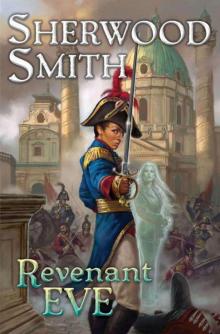- Home
- Sherwood Smith
The Thrones of Kronos Page 7
The Thrones of Kronos Read online
Page 7
“No, I just did that,” the squat woman said dryly. “Although I suspect the chips themselves are still around somewhere.” Lar noticed the little blonde looking her way. “And to replace that data, may I request some chips on the Dol’jharian language? And sufficient dataspace for them.”
Lar nodded, relieved. They seemed to have picked up his hint about the spy-wired console. “I think I can get some for you. Any other requests?”
“The food.” The ugly, bearded one spoke, his voice a deep rumble. “I am a Golgol chef. The food here offends me. If I may request a few basic ingredients and be permitted to visit my ship to retrieve some supplies, I can prepare meals that will maintain Vi’ya’s health, which will be to your masters’ benefit.”
Lar was on the verge of saying They aren’t my masters but caught himself just in time. Seeing Rifters again made his desire to proclaim his own loyalties almost overwhelming, but that would be a deadly mistake. Instead, he nodded. “I’ll see what I can do about the food, but I ought to warn you that what you get is what we all get. Unless you want to eat Ur-fruit?”
The ugly man looked puzzled, while the blonde laughed and pounced to tweak at the handsome man’s crotch.
Lar blushed, realizing that the phrase was not as innocuous in Uni as it was in Bori. “It grows out of the walls. We have to buy it with extra labor, but some of the flavors are worth it.” He couldn’t tell them about the addictive ones, not with narks in the walls.
“Sounds rather repellent,” said the big man.
“How does the station get the raw materials?” asked Ivard. He glanced over at the disposer chamber with the pipes running out of it through the usual grayed-out hole in the wall and his face lit up. “That’s nacky. Just like a ship.” Then he grimaced. “But I wouldn’t eat it, anyway. Can’t we use the Telvarna’s supplies, like Montrose wants?”
Montrose. That’s one name. He wished Morrighon had told him more. Then he noticed Vi’ya looking at him. Had she read that pulse of fear at the thought of the recycling chamber?
He looked away. “I can only ask,” he replied carefully.
The middle-aged woman spoke, and Lar pivoted in surprise. She was speaking Bori. “I Sedry be, Larghior. We grateful will be for thing you conditionally attempt.”
He smiled at her: she had used the written-discourse mode and mangled the aspect of “do,” but the result was intelligible. He noticed the big man look at her in surprise as he gave into impulse, and said, “Call me Lar.”
The rest of the crew introduced themselves then, each with a question or complaint, ending with the Dol’jharian.
“I am Vi’ya.” She smiled faintly. “My request is that the mind-blur nearest us be turned down. Its presence disturbs me.”
He nodded again. She was different from the station Dol’jharians, but he was still afraid of her. “I’ll find out about all your requests. And I’ll be back to tell you.”
“Thank you, Lar,” the squat woman said, and smiled.
Lar made a polite smile back and tabbed the door open. As he toiled back up the corridor again, he thought over the interview. Tat’s words returned to him. Imprisoned on Ares. And now here. The only other Rifters on the Suneater. Lar began to feel that he and his cousin and brother were a bit less alone, and for a Bori, that was a very good feeling.
FOUR
ARES
Ten years ago, Sebastian Omilov had believed all the meaning leached from Panarchic ritual when he was unable to prevent a terrible injustice. Until very recently, he’d done his best to avoid considering how deep that sense of betrayal had reached.
Recent months had taught him that synecdoche could be a dangerous thing: perception of a part of a situation was not always a trustworthy gauge of the whole.
The restoration of his faith in his old friend, Panarch Gelasaar hai-Arkad, now deceased, in turn had re-imbued Panarchic ritual with all its old significance. His heart seemed to swell in his chest as the new Panarch, Gelasaar’s third son Brandon, placed the Blason de Guerre around Admiral Ng’s neck.
The short woman rose with an athlete’s neat grace and bowed to Brandon in the correct degree; his deference in return was a degree deeper than strict protocol required. Then the other Privy Councilors came forward to receive her into their number.
As Omilov approached, the blue gaze of the new Panarch, Brandon hai-Arkad, swept across him, polite but remote.
Omilov’s heart ached with sorrow; he could not suppress a memory flash of those same blue eyes, neither remote, or polite, or bland during that harrowing interview in this very same location after the Rifters had left for the Suneater. At the end the mask had returned, and the light voice had regained its relentless control, but in the resumption of protocol—the outward forms of respect—it became agonizingly clear to Omilov that he had lost Brandon’s confidence, just as Gelasaar had once lost his. He was still a Privy Councilor, still a valued adviser, but no longer a trusted friend.
Omilov shut his eyes and indulged in a daydream of escape and flight on the heels of the Rifters. What was it like? What might he discover there? Too quickly memory intruded yet again: his brief interview with Eusabian, then the horrifying experience with the torturer. He shook his head, making a mental effort to shake away unwanted memory. Little as the Panarchist military experts valued the Suneater as an artifact, the Dol’jharians would care even less.
The ceremony ended, and the appearance of gloved stewards bearing trays turned it into a reception for the new high admiral. All around him the strict ranks broke into informal circles, the silence of ceremony giving way to the hum of polite chat. Omilov was surrounded by people, but rarely had he felt so alone.
With practiced indirection he excused himself and left.
The transtubes grew steadily more crowded as he moved towards the axis of the Cap, toward the nexus with the oneill. The pod jolted into motion, with Omilov squeezed among a group of workers returning from a shift. Most of the faces around him seemed to reflect his own mood: tired, pensive, tense.
Omilov put back his head, scanning the destination screens for something to do. Two stops before his he saw “Jehan Gardens” and impulse made him say, “Leaving!”
When the tube ground to a halt, he emerged onto a pleasant pathway lined by chime trees and aromatic shrubbery. Some of his depression lifted. To his right lay the ordered gardens, which sloped away toward the lake. And to the left—the Whispering Gallery.
As he trod down the path toward the ivy-covered building, he tried to examine his impulse. Gossip had always left him cold, whether social or political. He had been to Montecielo frequently during his days in Court, but he had never had the slightest interest in threading his way through the Whispering Gallery there.
Omilov had no intention of talking. What he wanted to hear was if anyone, anywhere, discussed the Suneater—if anyone felt the way he did. I have been too isolated, by my own choice, he thought. Now I want to evaluate my actions in others’ eyes.
Smiling with self-mockery, he entered, finding himself surrounded by light and air and soft greenery bracketed by mirrors and glass in complicated patterns—like facets on a crystal. As expected, he heard snatches of conversation, but energetically set out in opposite directions to carry himself out of earshot.
Four, five times he did that, and then he came face-to-face with a large, white-haired old woman of style and poise.
“Sebastian Omilov,” she exclaimed with sardonic amusement.
Omilov bowed. “Your Grace—”
Uncompromisingly elegant, Lady Britt Vakianos, Archonei of Kemal, had been a byword in a previous generation. She touched Omilov’s wrist. “I prefer ‘Aunt Britt,’ dear boy. Or is a Praerogate Overt beyond familiarity?”
Ten minutes ago Sebastian Omilov had felt old and tired. Now he was reduced to schoolboy blushes.
The matriarch’s eyes narrowed, and she pulled him toward a bench screened off by ferns. The soft plash of a waterfall over glass muted their voices. “Your moth
er is well, though she remained at Chernakov,” she said low-voiced. “I think she has finally forgiven you for withdrawing from Court.”
Omilov laughed, feeling equal parts amusement and pain.
“You know why we did not leave after Tared’s suicide,” she went on, hands folded and voice as direct as her gaze.
“I thought—” Omilov stopped, shook his head.
“You thought we concurred. No, it was just the opposite. Why do you think Semion avoided Court so assiduously? He was afraid to face those of us who understood very well what he was about. And when Gelasaar finally discovered what Tared had done, he needed us there around him.”
Omilov breathed out, facing the last of the grim truths. “I was not the only one who lost faith.”
Her face reflected his pain, looking old and worn. “Tared did, at the last, lose faith in his boy. In his defense, you know what a storm that adoption caused, his passing over several promising youth in the family connections. But to believe that Markham, perhaps led by the Krysarch, had not just broken those sacred Academy rules that everyone else seemed to wink at, but cheated on tests on material that he found simple when he was twelve . . .” She shook her head. “And when the decree ex gratia regis came through in Gelasaar’s name, Tared did not wait for either Markham or Gelasaar to explain themselves. You probably did not know that Ujio was there when the young man arrived just barely ahead of Semion’s ‘safety net,’ in order to tell his father what truly had happened, only to discover that he was too late?”
“No. I did not,” Omilov said, though he knew that she knew. But it seemed necessary to admit obliquely that he had refused communication from her, from his Uncle Ujio, from everyone. Just like Tared shutting everyone out.
“That, Sebastian, was the worst tragedy of all.” She daubed her eyes with a handkerchief, then gave it a snap. The moisture wicked away in sparks, restoring the square to pure white as she tucked it back into her pocket. “No one could help Markham. He wouldn’t risk anyone else, he insisted, but Ujio said it was as if he’d died along with Tared. Then he slipped away, and Semion’s Marines arrived in force and tore the entire estate apart looking for him. No one ever saw Markham again, but Ujio later received a message that he’d made the Riftskip, and who could blame him?”
“Not I,” Omilov said, wincing. “I was not there for Gelasaar nor Tared.”
“But it seems you have paid, twice over, my dear.” She smiled. “Old politics can wait for another time. There’s enough to discuss in the new. But first, what brings Sebastian of the Steadfast Heart here at this hour?”
Omilov hesitated, then said, “I don’t understand.”
“It’s just past nineteen hundred—late afternoon in Highdwellings and planets with days close enough to Standard. Socially the deadest hour, until recently.” She laughed. “This is more like you. Did you not know about the latest fashion? The Cartano girl has decreed that the hour of five in the Whispering Gallery is to be given entirely to discourse on themes. The current one is love.”
It was so unexpected—so much the opposite of what he had expected—that Omilov had to laugh.
The Archonei’s eyes quirked with irony. “After war, death, and destruction, it appears people still have a taste for the purely frivolous. Young Vannis has reestablished my faith in human nature.”
Omilov also smiled, but he did not know what to say to that, so he changed the subject. “You know that the Prophetae Anton Ramanujan is here? Though he goes by ‘Tate Kaga’ now.”
“It is he who summoned me,” the Archonei said. “And the difficulties in getting here would require another long hour in the telling.” She chuckled under her breath. “Skipping in and out with Rifters on our radiants . . . suddenly it seems eighty days ago, and not eighty years, when we scrambled over the rocks at Petrov, a jac in each hand, trying desperately to fend off the Shiidra.” She shook her head. “It really does seem a short time ago. But so does your youth, when you and Ilara and Gelasaar staged operas at the Palace Minor, and Brandon and Galen were scrubby brats running about teasing the life out of that black-browed little bully Dol’jhar had sent us as hostage. And now we are old, and they—the two who remain—are the main players in the game.” She slapped her hands on her lap. “Though we still have a few tricks left. I’m here to help Gelasaar’s boy pull together a fleet. We’ve called in all our ships: if we win it, we rebuild, and if we lose, we’re ruined anyway.”
Omilov said quickly, “Kemal—”
“The Clouds are occupied by Dol’jhar, and the planet is fine, though no one is permitted to land or leave. He won’t trust Rifters there after our sabotage was blamed on them, but he won’t get anything out of us for a long time.” She stood up and took Omilov’s arm. “If you’ve changed your mind about the Gallery, then let’s stroll among the roses, and you tell me a little about this Telos-damned Suneater.”
It was two hours later when he finally reached the Cloisters. Though he was not a religious man, he liked the Cloisters for its sense of peace and timeless otherness. A trace of fragrant incense wove itself among the scents of rare blooms. In the distance he heard the rise and fall of voices in a plaintive chant that evoked millennia of human experience.
When he stepped onto the terrace around which the residence portion of the Cloisters was built, he found the High Phanist waiting. Although Omilov had begun their association by distrusting her, he now looked forward to their daily talks. On some days she was the only human being he communicated with outside the requirements of his research.
She sat quietly, the Digrammaton on its chain glinting against the plain black of her soutane.
“I went to the Jehan Gardens,” he said. “There I met someone I’ve known all my life, and in the course of conversation she observed how swiftly time passes. Yet her lifetime is less than a blink of an eye against the unimagined millennia the Suneater has existed. The potential for learning, were we able to establish an observation post there, is tremendous. Yet no one here can see past immediate circumstances. They see the Suneater only as a target in this war.” He rubbed his cheek absently; the remembered pain would perhaps never go away. “I acknowledge the necessity for action, but I cannot get them to see past its destruction.”
“Is not the Panarch’s goal contiguous with yours?”
Omilov looked from Eloatri to the bees bumbling among the stirring blossoms. “Only as far as guaranteeing the safety of the Rifters is concerned.” He shook his head. “My original impulse was to walk through the Whispering Gallery. I have never been in it, but my understanding was that one can hear converse on every subject if one stays long enough.”
Eloatri smiled. “I have been through it. The experience reminds me of the function that cards of divination must have served for our ancestors.”
“Well, there was to be nothing, divination or otherwise, for me,” Omilov said. “At least at that hour, which is restricted to a theme. The Archonei of Kemal dismissed as mere frivolousness Vannis’ introduction of love as the current theme.”
Eloatri drew an audible breath.
Omilov glanced up. “You have an observation to make, Numen?”
“Not yet,” she murmured, rubbing one thumb over the scarred palm of her other hand. “Not yet. Go on.”
“There’s little else to tell you except I thought of Brandon, who, despite his new position as ruler of trillions, wants to follow Vi’ya to the Suneater. Love may blind one to wise action, but it is not always frivolous.”
“No.”
“If he does go, then perforce the Navy will have to preserve the station,” Omilov said. “But ought I to hope he gambles his life this way?”
The High Phanist said nothing.
“That is my dilemma.” Omilov sat back, sighing. “Then, just as I was leaving, another one of those accursed novosti tried to corner me. A lot of impertinent questions about the Suneater, the attack, and the Telvarna Rifters, who are still officially listed simply as ‘not here.’”
Elo
atri nodded. “And one other question, I assume.”
Omilov looked up in an unguarded movement of protest. Then he saw the pain in the High Phanist’s eyes. Pain that matched, he supposed, that in his. They were both in disgrace with the Panarch, both guilty of conniving the escape of the woman the Panarch loved.
“They pursue me as well. ‘Let those with eyes to see,’” she quoted, letting her voice trail off.
“Well, eyes they may have,” Omilov said, “and I suppose our positions are evident from the shifting of preference and deference, but I gave their ears nothing. If the novosti find out where the Rifters went, and what their captain means to him, then Brandon loses all freedom. As head of state taking his forces to war he might go, but to chase a Rifter lover? We would revert right back to chaos. A political reality.”
The High Phanist rubbed her palm.
“You disagree? Ought I to have told the truth?”
“I cannot direct you on that,” Eloatri said. “But I admit I was thinking along a different track.”
“Which is?”
“Those cards of divination, I mentioned,” she said, smiling sadly. “And Vannis Scefi-Cartano’s new fashion.” She rose to her feet, turned, then turned back. “Love is not frivolous,” she said. “Danger, inspiration, catalyst, wise, blind, but never frivolous. Never frivolous,” she repeated.
o0o
The new High Admiral of the Panarchy of the Thousand Suns could not sleep.
Her cheek muscles ached from so much smiling, and her head throbbed, even though she had managed to make her last glass of celebratory champagne last for hours. She had lost count of the times she had nodded, smiled, lifted it in return to someone’s toast, and pressed it to her lips without letting any liquid actually pass them.
At last the after-party was over, and she was able to retire to rest.
But exhausted as she was, she still could not sleep.
Finally Margo Ng tabbed on a light and rose, padding across toe-soft carpet down the few stairs to one of the anterooms, and through that to the study that was now hers.

 Inda
Inda Danse De La Folie
Danse De La Folie King's Shield
King's Shield Whispered Magics
Whispered Magics Fleeing Peace
Fleeing Peace Barefoot Pirate
Barefoot Pirate Crown Duel
Crown Duel Mearsies Heili Bounces Back
Mearsies Heili Bounces Back Commando Bats
Commando Bats A Stranger to Command
A Stranger to Command Lhind the Spy
Lhind the Spy The Spy Princess
The Spy Princess Blood Spirits
Blood Spirits Sasharia en Garde
Sasharia en Garde Lhind the Thief
Lhind the Thief Paradise Drift
Paradise Drift Banner of the Damned
Banner of the Damned The Trouble With Kings
The Trouble With Kings Poor World
Poor World Treason's Shore
Treason's Shore Wren Journeymage
Wren Journeymage A Posse of Princesses
A Posse of Princesses Revenant Eve
Revenant Eve Once a Princess
Once a Princess Time of Daughters I
Time of Daughters I Rondo Allegro
Rondo Allegro Coronets and Steel
Coronets and Steel Over the Sea
Over the Sea Senrid
Senrid Hunt Across Worlds
Hunt Across Worlds A Sword Named Truth
A Sword Named Truth The Fox
The Fox Twice a Prince
Twice a Prince Fair Winds and Homeward Sail: Sophy Croft's Story
Fair Winds and Homeward Sail: Sophy Croft's Story Time of Daughters II
Time of Daughters II The Rifter's Covenant
The Rifter's Covenant The Phoenix in Flight
The Phoenix in Flight Stranger
Stranger The Thrones of Kronos
The Thrones of Kronos A Prison Unsought
A Prison Unsought Twice a Prince: Sasharia En Garde Book 2
Twice a Prince: Sasharia En Garde Book 2